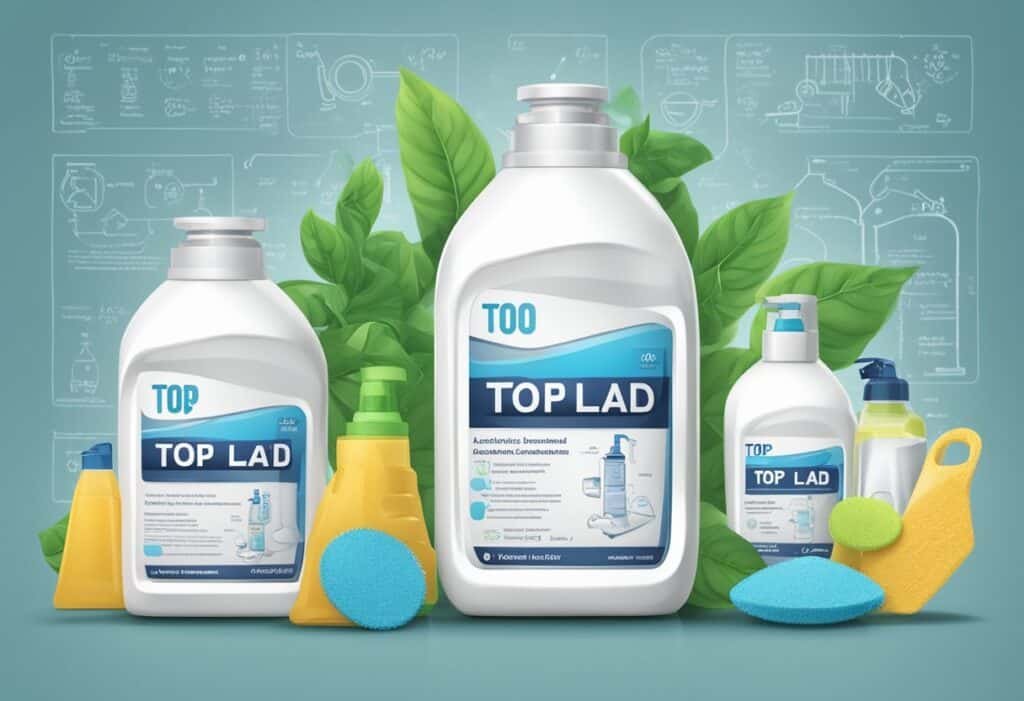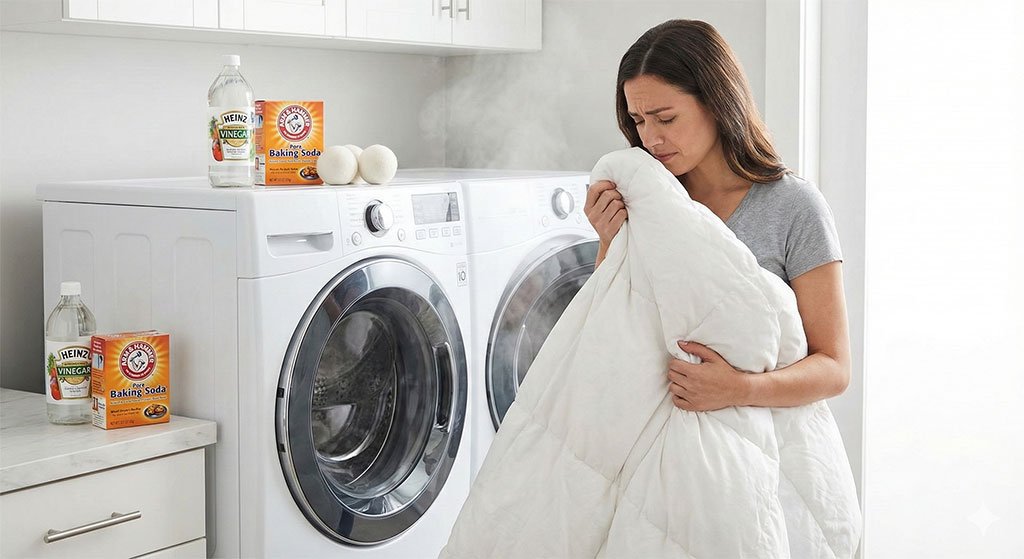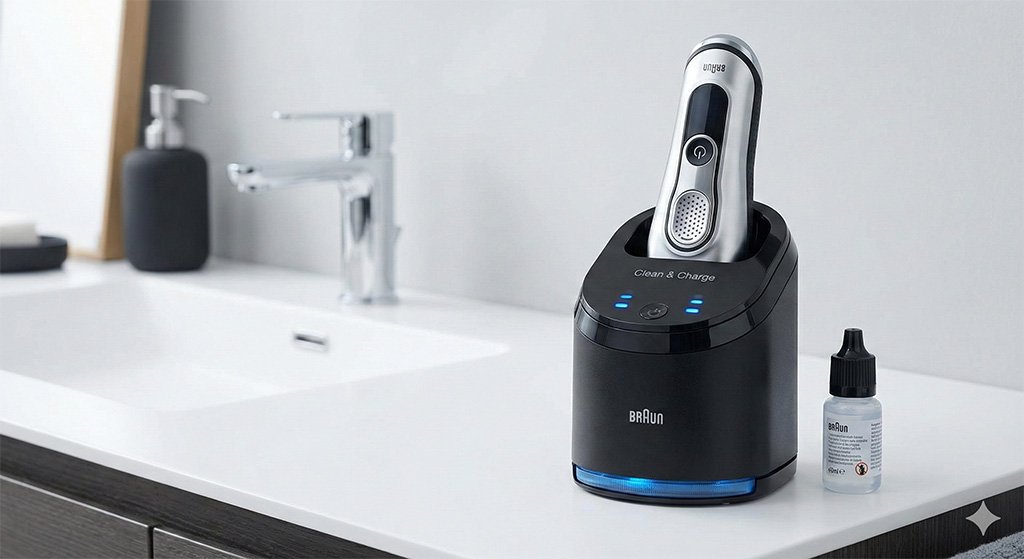Top load and front load washing machines have become increasingly popular in recent years. Many people are still unsure about the difference between top load and front load detergents and whether they can be used interchangeably.
The main difference is their formulation related to suds creation. Front load washing machines use less water and require less detergent, which means that their detergent formulas need to be low-sudsing. On the other hand, top load washing machines use more water and require more detergent, which means that their detergent formulas need to be high-sudsing.
Using the wrong type of detergent can result in poor cleaning performance, excess suds, and even damage to the washing machine. Therefore, it is important to choose the right detergent for your washing machine to ensure that your clothes are cleaned effectively and your washing machine remains in good condition. In the following sections, we will explore top load vs front load detergents in more detail and provide tips on how to choose the right detergent for your washing machine.

Table of contents
Fundamentals of Laundry Detergents
Laundry detergents are essential for removing dirt, stains, and odors from clothes. They contain a blend of surfactants, enzymes, builders, and other additives that work together to break down and lift away dirt and grime.
Surfactants are the key cleaning agents in laundry detergents. They work by lowering the surface tension of water, allowing it to penetrate the fabric and loosen dirt and stains. Enzymes are added to detergents to break down specific types of stains, such as protein-based stains like blood and grass. Builders are added to enhance the cleaning power of the detergent by softening water and preventing mineral deposits from forming on clothes.
There are two main types of laundry detergents: powder and liquid. Powder detergents are typically more affordable and effective at removing stains, while liquid detergents are easier to use and work better in cold water.
In addition to powder and liquid detergents, there are also specialized detergents for different types of washing machines. Top-load detergents are designed to produce more suds or lather, which is appropriate for the working of top-load machines. Front-load detergents, on the other hand, are formulated to produce less lather or suds, making them suitable to work with high-efficiency washers.
It is important to choose the right detergent for the type of washing machine you have to ensure that you get the best cleaning results. Using the wrong detergent can lead to poor cleaning performance, excess suds, and even damage to your washing machine.
Chemical Composition
When it comes to the chemical composition of detergents, there are some differences between top load and front load detergents. In this section, we will look at the ingredients that are commonly found in each type of detergent.
Ingredients in Top Load Detergents
Top load detergents are designed to work in machines that use more water and have shorter wash cycles. As a result, these detergents tend to have more surfactants, which are the ingredients that help to lift dirt and stains from clothes. They also contain more enzymes, which are proteins that break down stains and help to keep clothes looking clean.
Top load detergents typically contain the following ingredients:
- Surfactants: These are the primary cleaning agents in top load detergents. They help to lift dirt and stains from clothes and keep them suspended in the water.
- Enzymes: These are proteins that break down stains and help to keep clothes looking clean.
- Builders: These are ingredients that help to soften hard water and prevent mineral buildup in the washing machine.
- Optical Brighteners: These are ingredients that help to make clothes look brighter and whiter.
Ingredients in Front Load Detergents
Front load detergents are designed to work in machines that use less water and have longer wash cycles. As a result, these detergents tend to have fewer surfactants and more water softeners. They also have low sudsing formulas, which means that they produce less foam than top load detergents.
Front load detergents typically contain the following ingredients:
- Surfactants: These are the primary cleaning agents in front load detergents. They help to lift dirt and stains from clothes and keep them suspended in the water.
- Water Softeners: These are ingredients that help to soften hard water and prevent mineral buildup in the washing machine.
- Low Sudsing Formula: These are ingredients that produce less foam than top load detergents. This is important because front load washing machines use less water, and too much foam can interfere with the washing process.
Overall, the main difference between top load and front load detergents is their chemical composition. Top load detergents contain more surfactants and enzymes, while front load detergents have fewer surfactants and more water softeners.
Mechanics of Washing Machines
Washing machines come in two main types: top load and front load. Both types use different mechanisms to wash clothes.
Top Load Washing Action
Top load washing machines use an agitator or impeller to move clothes around in a tub filled with water and detergent. The agitator has fins or paddles that rotate back and forth, creating a turbulent flow of water that agitates the clothes. The impeller, on the other hand, has a low profile and rotates to create a gentle current that moves clothes around without tangling them.
Top load washing machines generally require more water and detergent than front load machines. They also tend to be harsher on clothes, as the agitator or impeller can cause damage to delicate fabrics.
Front Load Washing Action
Front load washing machines use a tumbling action to wash clothes. The drum rotates on a horizontal axis, lifting clothes up and dropping them back down into the water and detergent. The tumbling action creates a gentle current that cleans clothes without damaging them.
Front load washing machines require less water and detergent than top load machines. They are also more energy-efficient, as they use less water and require less energy to spin the drum. However, they can be more expensive to purchase upfront.
In summary, top load washing machines use an agitator or impeller to move clothes around in a tub filled with water and detergent, while front load washing machines use a tumbling action to wash clothes. Each type has its own advantages and disadvantages, and the choice between the two ultimately depends on personal preference and needs.
Efficiency Considerations
Water Usage
Front load washing machines use less water than top load washing machines. This is because front load washers have a horizontal drum that rotates on a horizontal axis, allowing clothes to tumble in and out of the water. On the other hand, top load washing machines have a vertical drum that fills with water and agitates the clothes. This means that front load detergents are designed to produce fewer suds, requiring less water to rinse them away.
Energy Consumption
Front load washing machines are more energy-efficient than top load washing machines. This is because front load washers use less water, which means less energy is required to heat the water. Additionally, front load washers have a faster spin cycle than top load washers, which means clothes come out of the washer with less water, reducing the amount of energy required to dry them.
Detergent Amount
Front load washing machines require less detergent than top load washing machines. This is because front load washers use less water, which means less detergent is needed to create suds. Additionally, using too much detergent in a front load washer can cause excess suds, which can damage the machine and reduce its efficiency. Therefore, it’s important to use the recommended amount of detergent for your front load washer.
Overall, when it comes to efficiency considerations, front load washing machines and their corresponding detergents are the better option. They use less water, less energy, and require less detergent.
Detergent Formulations
When it comes to choosing between top load and front load detergents, one of the main differences is in their chemical compositions.
High-Efficiency (HE) Formulas
High-Efficiency (HE) formulas are specifically designed to work with high-efficiency washing machines that use less water than traditional top load machines. These detergents produce less lather or suds, which helps the washing machine to rinse the clothes more effectively. HE formulas are also more concentrated than standard formulas, which means that a smaller amount of detergent is needed to get the job done.
Standard Detergent Formulas
Standard detergent formulas are designed to work with traditional top load washing machines. These formulas produce more lather or suds than HE formulas, which can be a problem for high-efficiency machines. The excess suds can cause problems with the machine’s sensors and may even lead to leaks. Standard formulas are less concentrated than HE formulas, which means that more detergent is needed to get the same cleaning power.
Overall, it is important to choose a detergent that is specifically designed for your washing machine. Using the wrong type of detergent can lead to problems with cleaning effectiveness, machine performance, and even machine damage. By understanding the differences between top load and front load detergents, you can make an informed decision and keep your clothes clean and your machine running smoothly.
Impact on Clothing Care
The type of detergent used in a washing machine can have a significant impact on clothing care. Front-load washing machines typically use less water and require less detergent compared to top-load washing machines. This is due to the fact that front-load washing machines use gravity to tumble clothes, which results in better cleaning with less water and detergent.
Using the wrong type of detergent can damage clothing and even the washing machine itself. Top-load detergents are designed to produce more suds, which can cause problems in front-load washing machines. Suds can build up and cause the machine to malfunction or even leak. On the other hand, front-load detergents are formulated to produce fewer suds, which is better suited for front-load washing machines.
It is important to follow the manufacturer’s recommendations for detergent usage and to use the appropriate type of detergent for the washing machine. This will help to ensure that clothing is cleaned effectively and that the washing machine is not damaged.
In addition to the type of detergent used, the amount of detergent used can also impact clothing care. Using too much detergent can leave residue on clothing, which can cause skin irritation and damage to the fabric. Using too little detergent can result in clothing not being cleaned effectively. It is recommended to use the appropriate amount of detergent as recommended by the manufacturer.
Overall, using the appropriate type and amount of detergent can help to ensure that clothing is cleaned effectively and that the washing machine is not damaged.
Environmental Concerns
When it comes to environmental concerns, front load detergents are often considered to be more eco-friendly than top load detergents. This is because front load washing machines use less water and energy than top load washing machines. According to the National Park Service, the average washing machine uses about 41 gallons of water per load, and top load washing machines can use even more water than that. In contrast, front load washing machines use between 14 and 25 gallons of water per load, which is a significant reduction in water usage.
In addition to using less water, front load washing machines also use less energy than top load washing machines. This is because they spin at a faster rate, which means that clothes come out dryer and require less time in the dryer. According to Energy Star, front load washing machines can use up to 65% less energy than top load washing machines.
Another environmental concern is the use of harmful chemicals in laundry detergents. Many detergents contain chemicals that are harmful to the environment, such as phosphates, which can cause algal blooms in waterways. Front load detergents are often formulated to be more environmentally friendly than top load detergents. They may contain fewer harmful chemicals and be more biodegradable.
Overall, when it comes to environmental concerns, front load detergents are often a better choice than top load detergents. They use less water and energy, and may contain fewer harmful chemicals. By choosing a front load detergent, consumers can help to reduce their impact on the environment.
FAQ
What are the specific differences in formulation between top load and front load detergents?
The formulation of top load and front load detergents differ in terms of their sudsing action and ingredients. Front load detergents are formulated to produce fewer suds, as front-loading machines use less water than top-loading machines. In contrast, top load detergents produce more suds to effectively clean clothes in the larger amount of water used by top-loading machines. Front-load detergents also contain ingredients that help prevent the growth of mold and mildew, which can be a problem in front-loading machines.
Is it possible to use detergents labeled for top load washers in front load machines without issues?
While it is possible to use top load detergents in front load machines, it is not recommended. Top load detergents produce more suds than front load detergents, which can cause problems in front-loading machines. Excess suds can lead to poor cleaning performance, as the suds can prevent clothes from agitating properly. Additionally, excess suds can cause damage to the machine, as they can build up in the drum and cause it to become unbalanced.
Why is it recommended to use specialized front load detergent in front loading washing machines?
Front load detergents are specifically formulated to work with the lower water levels and tumbling action of front-loading machines. They produce fewer suds, which prevents them from building up in the machine and causing damage. Additionally, front load detergents contain ingredients that prevent the growth of mold and mildew, which can be a problem in front-loading machines due to their airtight seals.
What could happen if I use a regular detergent instead of a high-efficiency one in a front load washer?
Using a regular detergent in a front load washer can cause excess sudsing, which can lead to poor cleaning performance and damage to the machine. The excess suds can prevent clothes from agitating properly, which can leave them dirty. Additionally, the suds can build up in the machine and cause it to become unbalanced, which can lead to damage to the drum and other parts of the machine.
How does using the incorrect type of detergent affect the performance of my washing machine?
Using the incorrect type of detergent can lead to poor cleaning performance and damage to the machine. Excess suds can prevent clothes from agitating properly, which can leave them dirty.
Additionally, excess suds can build up in the machine and cause it to become unbalanced, which can lead to damage to the drum and other parts of the machine. Using the wrong type of detergent can also cause mold and mildew to grow in the machine, which can be difficult to remove and can cause unpleasant odors.
Are there any benefits to using front load specific detergent in a top load washing machine?
While front load detergents are specifically formulated for front-loading machines, they can also be used in top-loading machines. However, there are no significant benefits to using front load detergent in a top-loading machine.
Top load detergents are formulated to produce more suds, which is necessary to effectively clean clothes in the larger amount of water used by top-loading machines. Using a front load detergent in a top-loading machine may result in poor cleaning performance, as the detergent may not produce enough suds to effectively clean the clothes.



